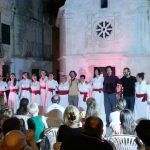Continuing our look at the indigenous grapes of Croatia, a visit to the island of Hvar to meet a grape which translates as ‘a gift from God’.
If you’ve never been on the Croatian island of Hvar, you’ve probably never had Bogdanuša wine, an autochthonous white wine, found almost exclusively on that island – that has been, as legend has it, grown there since the time of the ancient Greeks. Originally found on the Stari Grad Plain, a cultural landscape protected by UNESCO that has remained practically intact since it was first colonized by Greeks in the 4th century BC and where vines were one of the major crops, along with the olives. It is a white wine of a very rich greenish-yellow colour, unexpectedly fresh taste (with just the right amount of bitterness that is rarely found in other wines from the Croatian islands) and quite low alcohol content, almost always around 12%. Those that like bogdanuša will tell you that its taste reminds them of the lavender that has also been traditionally grown in Stari Grad Plain, alongside the vines.
Bogdanuša is suspected to have been brought to the island by the Greeks (and some genetics testing has been done thus far, but the results are not conclusive). One of its special features is that it gives best grapes on deep, fertile and relatively moist soils (which is, coincidentally, the exact description of the soil in the Stari Grad Plain), but cannot be grown to produce wine in other locations in Dalmacija, because the soil there is thin and dry karst. So, it will probably remain secluded on the Hvar Island in the future as well, and it will never be produced in the large quantities and sold more widely.
So, your best chances are to have it on Hvar, coupled with local cuisine and it will compliment your seafood dish almost perfectly. The most notable producers are obviously local to Hvar, Carić, PZ Svirce and Plančić. The only other option for having bogdanuša is a traditional blend that is made with trbljan bijeli and maraština (also autochthonous white wines in Dalmatia region), that is usually sold under the name “Kaštelet bijeli”, and is quite affordable.
The name Bogdanuša literally translates as ‘a gift from God’.










